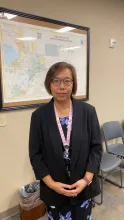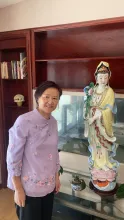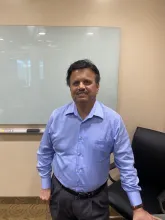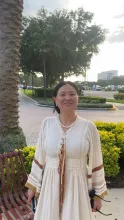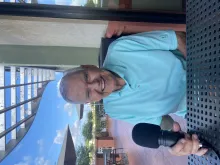Henry Flagler. As founder of the Florida East Coast Railway, industrialist Henry Flagler played a major role in the development of the state. We visit St. Augustine, Palm Beach, and Key West to discuss his impact on Florida.
The Seminole (along with the Miccosukee) are the indigenous people of Florida. Seminole history and culture is preserved at the Ah-Tah-Thi-Ki Museum on the Big Cypress Reservation.
Carpenter Gothic Churches in Florida. Dozens of Carpenter Gothic style churches were built in Florida in the 19th century.
Shally Wong was born in Kowloon, Hong Kong, in 1969. She recounted her upbringing, particularly growing up in a single-mother household as the youngest of four. She mentioned how the Cultural Revolution in China affected her family, particularly her father’s absence during her early years. She recalled the financial difficulties her family faced during her formative years, highlighting how her older sister had to work at an early age to support the family. Educational and professional opportunities prompted her to leave Hong Kong and emigrate to Vancouver, Canada, in 1986. After graduating with a bachelor’s in business administration, she returned to Hong Kong to officially process her immigration visa. In 1991, Shally arrived in Orlando, Florida, reuniting with her oldest sister, who had lived in Central Florida for over a decade at that point. She quickly realized how work provides stability in the US and the lack of Asian cultural knowledge in Orlando, mainly when she worked for her sister’s Chinese restaurant. This limited understanding of Asians inspired Shally to create Asia Trend in 2005, an online magazine that provides news for Asian American happenings in Florida, thereby promoting Asian American culture. She also explained how the magazine functions as a tool to preserve Asian American culture, especially for future generations. Before joining Asia Trend, Shally worked in the for-profit world, outlining her experiences in several companies, including Toys R Us Asia, from 1996 to 1999. Since 2019, Shally has served as the official liaison to the Asian American community in Orange County as the special assistant to Mayor Jerry Demings. She discussed her role in detail and how she has reinforced her broader mission to preserve and promote Asian Americans in Central Florida. She outlined how the Asian American community in Orlando has changed over the past twenty-five years, while also detailing the region’s broader cultural evolutions and the continuous and contemporary challenges it faces.
Lai Fai “Anne” Tsoi was born in Hong Kong in 1958. Anne recollected memories of her upbringing, particularly growing up in a single-mother household. As the eldest child, Anne understood that she needed to fill in the vacancy of her father, who was held in a concentration camp by the Chinese government, and began working immediately after finishing high school to support her family. Continued financial difficulties and improved economic opportunities prompted Anne to leave Hong Kong and emigrate to the United States, specifically New York City, in 1980. Unable to adjust to the cold weather in New York and North Carolina, Anne convinced her husband to move to Orlando, Florida, later that year. Upon arrival, Anne and her husband immediately worked at Jin Ho Chinese restaurant to sustain their new life in America while sending money back to Hong Kong to support their family. Anne recounted the cultural shocks she initially experienced when working in Jin Ho. After roughly four years at Jin Ho, Anne and her husband transferred to China Garden, where she worked as a server and her husband as a cook. In 1983, Anne quit as she needed to raise her newly born son. During this time of transition, she and her husband planned to establish their own Chinese restaurant. In 1985, they opened China Chef at the corner of Goldenrod and University streets. Anne returned to work in this new operation, serving as the restaurant’s manager. She recalled the difficulties managing a restaurant and raising a child during this time. In 1997, Anne and her husband operated China Garden, the restaurant where they had previously worked, and for a brief moment, they owned two restaurants. They sold China Chef and continued to operate China Garden until 2017. Anne explained how their attempts to attract more clientele in Chian Garden changed within those twenty years. In retirement, Anne joined Asia Trend, an online magazine that reports on Asian American happenings, primarily in Central Florida, and promotes Asian culture throughout the state. Lastly, Anne shared her broader observations about Orlando and how it changed over the past forty-five years from 1980 to 2025, emphasizing the growth of the Asian community and the continual need to highlight their cultural and economic contributions to Central Florida.
Adrianna Tran was born in Pine Hills, Florida, in 1998. She recalled memories of her upbringing, particularly the stories she learned about her family’s Vietnamese heritage. Her maternal grandparents left Vietnam with their four children in 1985, experiencing the aftermath of the fall of Saigon in 1975. Additionally, Adrianna recounted her schooling experience across Central Florida and how she navigated her ethnic differences during this time. In 2017, Adrianna attended Florida State University (FSU), majoring in International Relations and English. Listening to National Public Radio (NPR) almost daily with her father while he took her to school sparked a curiosity to learn more about politics, culture, and the world around her, which subsequently inspired her to pursue such careers in college. After graduating from FSU in 2020, Adrianna worked for several institutions, including the Florida State House of Representatives as legislative aide for Rep. Camille Brown, Barry University Law School as the Director of Community Outreach and Advancement, and her current (c. 2025) position at Community Legal Services as the director of governmental relations in Orlando. She explained her motivations and roles in each occupation, particularly how her ethnic background informed her approach in her most recent position at Community Legal Services, where she helped immigrant and minority families in Central Florida with legal issues. Relatedly, Adrianna joined the Asian American Chamber of Commerce in 2021, discussing her involvement with the organization. Lastly, Adrianna shared her broader observations about Florida, its cultural changes, continuities, and challenges since the early twenty-first century.
Kannan Srinivasan was born in Madras, India, in 1966. Kannan recalled stories that his family passed down about India’s independence movement in 1947, particularly how his father’s participation and how Mahatma Gandhi encouraged him not to abandon his studies for the fight for freedom. Inspired by his father’s engineering career, Kannan studied electrical engineering at the Regional Engineering College, Tiruchirappalli, India. Familial connections and higher education opportunities prompted Kannan to leave India and emigrate to Orlando, Florida, in 1991. Kannan recounted the cultural shock he experienced upon arrival, specifically the abundance of white people and linguistic barriers. He also emphasized how his pre-immigrant perceptions of the United States changed once he settled in Orlando permanently. A brief stint working as a software engineer developing pagers for Motorola in South Florida interrupted his master’s timeline. He graduated with his master’s in computer engineering in 1996, the same time he landed employment with Cincinnati Bell/Convergys, where he worked for the next fifteen years. In 2009, Kannan founded Global KTech Incorporation and explained the circumstances that led him to create his own company. In 2013, Kannan joined the Asian American Chamber of Commerce and served as its president four years later. In addition to highlighting his personal motivations, Kannan underlined the organization’s broader significance for the Asian American community in Orlando. Lastly, Kannan shared his observations about Central Florida, both culturally and generally, while prognosticating the cultural and economic changes that might occur in the area’s future.
Hana Son was born in Grozny, Chechnya, Russia, in 1986. Hana recounted her upbringing, particularly how the increasingly violent circumstances in Chechnya at the turn of the 1990s prompted her father to move the entire family to Kazakhstan. Hana explained her Koryo-Saram heritage and how it presented unique opportunities and challenges in all phases of her life, whether growing up in Kazakhstan or living in Orlando. Hana studied international relations at Kazakh National University by Al-Farabi, citing her passion for learning about different cultures and peoples as the underlying reason. In 2011, Hana earned her master’s degree in business administration from a university in South Korea. She recalled the emotions she felt returning to her homeland. After her MBA, she worked as a contractor for the World Bank. Marrying her husband, who worked in the US Foreign Service, unexpectedly shifted Hana’s career trajectory to suddenly representing the US abroad and executing its foreign policy mission. Hana shared details about the various roles and places she had worked, including Russia, Pakistan, and India. She reflected on how each location strengthened her emotional resiliency and deepened her understanding of the US, its global projection, and the politics and culture of each country she served in. In approximately 2016, Hana and her husband returned to civilian life. Since then, Hana has worked to promote awareness of her Koryo-Saram heritage in Central Florida, primarily through her involvement with the Central Florida Korean Association. Through her cultural work, Hana seeks to challenge stereotypes about the state of Florida, such as perceptions of “Florida Man.” Additionally, Hana discussed how South Korean President Yoon Suk Yeol’s declaration of martial law in 2024 has affected Koreans living in Central Florida. Lastly, Hana outlined her observations about Central Florida and its cultural changes and challenges over the past nine years.
George Rodón was born in Santiago, Cuba, in 1947. George recounted his upbringing in Santiago, particularly the joyous mood once Fidel Castro took control of the island from the longstanding right-wing dictatorship of Fulgencio Batista. George explained how the elation quickly soured, prompting his family to flee Cuba on November 13, 1960, almost two years into the Castro regime. After a few months in Miami, George and his family moved to Ohio, where his father landed a medical residency to start practicing in the US. George attended the University of Maryland from 1966 to 1970 and majored in psychology and criminology. In 1971, George returned to Florida to work for the Division of Youth Services. In 1994, then-Mayor of Orange County Linda Chapin appointed George as chief of staff, recalling his broader experiences serving in that position. Given his extensive professional resume serving in prominent public roles and his personal experience living in Central Florida over the past fifty years, George shared his broader observations regarding continuities and changes in the region and state, which he has acquired since 1971.

